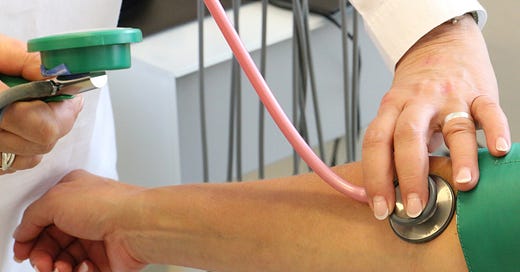A lesser-known way to lower your blood pressure
How a scan and two fat-soluble vitamins could be lifesavers
If you are diagnosed with hypertension, you will probably be given lifestyle advice that includes relaxation, exercise and a ‘healthy’ diet.
The ‘healthy diet’ part usually means low fat. But if you were to follow a low-fat diet, you would reduce your absorption of fat-soluble vitamins, including D3 and K2.
Big mistake. There’s a reason why vitamins D3 and K2 are often paired in supplements. It is a combination that could lower blood pressure and help prevent a heart attack.
About hypertension
Hypertension means that the pressure in your blood vessels is too high. It is a major risk factor for heart attack, stroke and death.
Normal blood pressure is considered to be between 90/60 mmHg and 120/80 mmHg. There are usually no symptoms of hypertension, but if blood pressure is very high - 180/120 mmHg or above - there may be headache, nausea, dizziness, nosebleed, buzzing in the ears and blurred vision. There may also be chest pain. These are all red flags that require immediate medical attention.
One major cause of hypertension is narrowing of the arteries serving the heart. This restriction reduces blood flow and gives rise to ischaemic heart disease, also known as coronary heart disease.
Along with lifestyle advice, you may also be prescribed medication. Blood pressure lowering drugs include ACE inhibitors and calcium channel blockers that work by relaxing the blood vessels.
Less likely than a prescription is the suggestion of a scan to check for coronary artery calcification (CAC), and more’s the pity.
CAC occurs when calcium in the blood starts to accumulate in damaged or inflamed arteries, forming deposits that cause the arteries to narrow and blood pressure to rise. The heart has to pump harder to get the blood to flow. When blood flow is restricted, so too is the supply of oxygen to the heart muscle. CAC is a ‘strong’ predictor of heart attack and death from cardiovascular disease.
CAC can be detected on a cardiac CT scan. A CAC scan provides information on the quantity, size and density of any calcium deposits, and gives an overall score. This score is considered an accurate predictor of future cardiovascular risk.
source
CAC scores increase with age, with men more likely to have higher scores than women.
There is no standard medical treatment for CAC, though in some cases a procedure called intravascular lithotripsy may be carried out. This involves a tube with a device on the end that sends out waves that break up the calcification. A stent is then inserted, to widen the blood vessel.
Prevention is always better than catheter, and part of the prevention approach is adequate intake of vitamins D3 and K2. It has been suggested that supplementing these two vitamins can reduce the progression of CAC.
Keep reading with a 7-day free trial
Subscribe to Your Nutritionist Recommends to keep reading this post and get 7 days of free access to the full post archives.





